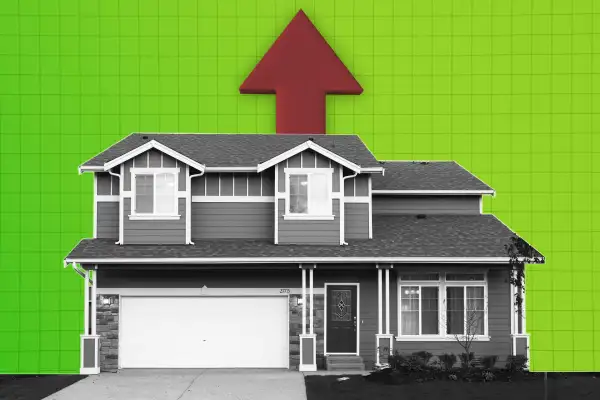11 U.S. Cities Where Home Prices Rose More Than 20% in a Year

The housing market is burning hotter and hotter — especially in parts of the U.S. known for hot weather. Home prices across the United States rose 19.2% on an annual basis in January, according to the S&P CoreLogic Case-Shiller Index, and prices are up much higher in Sunbelt cities like Phoenix and Tampa.
Record-breaking price growth comes thanks to a major uptick in demand for homes over the past two years combined with a serious shortage of inventory. Climbing mortgage rates are only making the mismatch in the market more severe: In recent months, prospective buyers have been rushing to lock in mortgages before rates rise even higher. Rising mortgage rates also mean prospective sellers are more likely to stay put rather than swap for a new home at a higher rate than their current mortgage.
“As a result,” CoreLogic’s report explains, “homebuyers that remain in the market are once again faced with a very competitive buying environment.”
Earlier this month, the listing platform Zillow forecast that the annual rate of home price growth will hit 22% by May.
Which cities have the fastest home price growth?
Of the cities in the S&P CoreLogic Case-Shiller 20-City Composite, Phoenix, Arizona, saw the largest annual price increase. In that city, home prices rose 32.6% on an annual basis in January.
Eleven cities in that index notched price gains greater than 20%. Here's the full list:
- Phoenix, Arizona: 32.6%
- Tampa, Florida: 30.8%
- Miami, Florida: 28.1%
- Dallas, Texas: 27.3%
- San Diego, California: 27.1%
- Las Vegas, Nevada: 26.2%
- Seattle, Washington: 24.5%
- Charlotte, North Carolina: 24.4%
- Atlanta, Georgia: 22.5%
- San Francisco, California: 20.9%
- Denver, Colorado: 20.8%
- Los Angeles, California: 19.9%
- Portland, Oregon: 17.7%
- Detroit, Michigan: 14.0%
- New York, New York: 13.5%
- Cleveland, Ohio: 13.3%
- Boston, Massachusetts: 13.3%
- Chicago, Illinois: 12.5%
- Minneapolis, Minnesota: 11.8%
- Washington, D.C.: 11.2%
Cities in the Sunbelt have become some of the hottest real estate destinations during the pandemic as buyers seek out more space and good weather amid more flexible working arrangements. Since March 2020, home prices are up a whopping 51% in Phoenix, according to Case-Shiller data, and they've increased 40% or more in Miami, San Diego and Tampa.
Unfortunately, those looking to escape the real estate frenzy by renting rather than buying in the Sun Belt aren’t likely to fare much better. A recent report found that rent prices in the Sun Belt rose at a rate of 22.5% over the past year. Miami saw the fastest growth, with rent prices climbing 55% between February 2021 and February 2022.
Washington, D.C., saw the slowest growth of all 20 cities included in the index, though home prices still rose 11.2% in January compared to a year earlier.
While rising rates will almost certainly make an already competitive market even more competitive in the near term, there will likely come a point when rates rise high enough to rein in home prices.
"Declining COVID cases and a resumption of general economic activity has stoked inflation, and the Federal Reserve has begun to increase interest rates in response,” Craig J. Lazzara, Managing Director at S&P Dow Jones Indices, said in a news release. “We may soon begin to see the impact of increasing mortgage rates on home prices."
Higher mortgage rates create higher monthly payments, and higher monthly payments might prompt some prospective buyers to sit on the sidelines until rates drop again. That reduces competition, which puts downward pressure on prices.
“Rising mortgage rates are going to zap a lot of purchasing power for buyers, which means they're just not going to be able to go after homes with the same aggressiveness that they might have before,” Realtor.com Chief Economist Danielle Hale recently told Money. “I think it's going to lead to a housing market that is way less intense and frenzied than we've seen recently.”
More from Money:
Spring Home Buying Guide: Will the Hot Housing Market Finally Chill Out?
10 Cities Where Homebuyers Are Most Likely to Face Bidding Wars
As Home Prices Soar, More People Say Buying a House Is a Bad Investment
